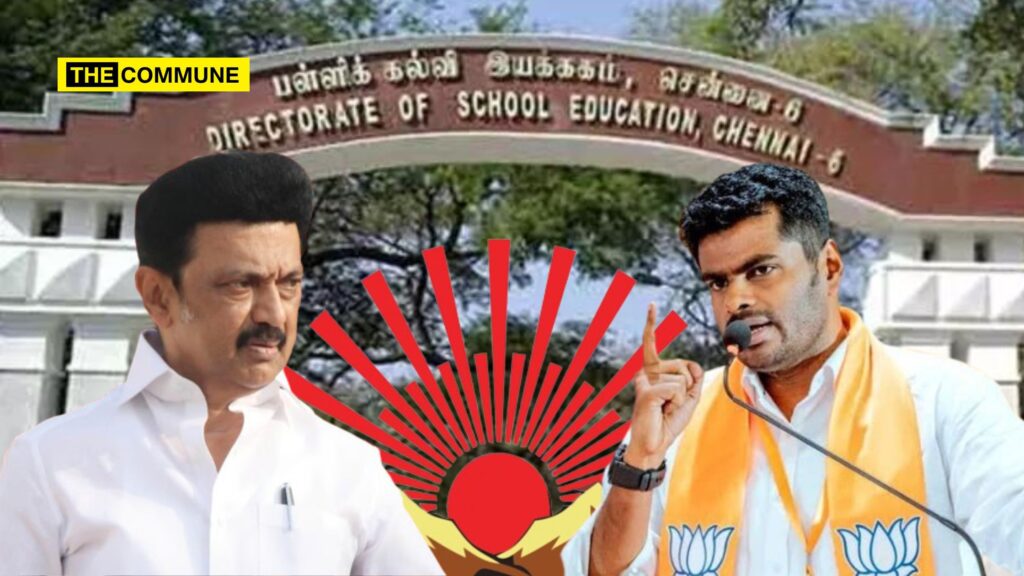Tamil Nadu BJP president K Annamalai has strongly criticized the ruling DMK government, raising serious questions about its financial mismanagement and governance issues in the state’s education department.
In a statement released on 22 December 2024, via his official X account, Tamil Nadu BJP president K. Annamalai criticized the DMK government, highlighting serious financial mismanagement and governance concerns. He stated, “It has come to light that internet services for 385 district education offices across Tamil Nadu have been disconnected due to several months of unpaid fees. Due to the disconnection, the education of the students has been severely impacted students’ education and there is also delayed the preparation of teachers’ salary lists. Under the DMK regime, Tamil Nadu has turned into a debtor state. Tamil Nadu is in debt to the tune of about ₹8.5 lakh crore. The CAG audit report has stated that the entire loan taken is used only for daily expenses and is not used for their intended purposes. If the district education offices are unable to pay the internet connection fees and the state has to rely on loans for daily expenses, then the question arises how the DMK government is actually spending the direct tax revenue of the Tamil Nadu government and the 70% of the funds that Tamil Nadu gets as its share in GST. Where is all this money going? He also questioned the Chief Minister, asking, “Is the Tamil Nadu government on the brink of bankruptcy? Chief Minister @mkstalin should provide an explanation to the people.”
தமிழகம் முழுவதும் உள்ள 385 மாவட்ட கல்வி அலுவலகங்களில் இணையதள இணைப்புக்கான கட்டணம், பல மாதங்களாகச் செலுத்தப்படாததால், இணைப்பு துண்டிக்கப்பட்டுள்ளது என்று தெரிய வருகிறது. இணைய இணைப்பு துண்டிக்கப்பட்டுள்ளதால், மாணவர்களின் கல்வி பெரிதும் பாதிக்கப்பட்டுள்ளதோடு, ஆசிரியர்களின் சம்பளப்…
— K.Annamalai (@annamalai_k) December 22, 2024
Government Schools in Tamil Nadu Face Internet Disconnection Amid Outstanding Bills
Recent reports revealed that over 3,700 high and higher secondary government schools in Tamil Nadu are at risk of losing their internet connections due to unpaid bills amounting to ₹1.5 crore owed to BSNL. This comes at a time when the state government is actively promoting smart classrooms and hi-tech labs in schools statewide.
These 3,700 schools, representing nearly 50% of the 6,223 high and higher secondary schools in Tamil Nadu, have reportedly not paid their internet bills for the past two to three months, primarily due to a lack of funds.
A circular issued by the school education department to district chief education officers revealed that the hi-tech labs in these schools operate using Fibre to the Home (FTTH) connections under the Samagra Shiksha Scheme. In a letter, BSNL’s Tamil Nadu Telecom Circle warned of service suspension if the dues were not cleared by Saturday.
Internet Upgrade Efforts Contrasted by Payment Delays
Earlier in May, the state government announced a partnership with BSNL to upgrade internet speeds in schools from 5-6 Mbps to 100 Mbps to meet the increasing demand for faster connectivity. By the end of May, high-speed internet had been installed in 5,907 out of 6,223 schools, with the remaining to follow soon after.
Funding Challenges and Impact on Schools
Headmasters highlighted that reliable internet is critical for the functioning of hi-tech labs, which support multimedia-based learning, career guidance, language classes, and mental health programs. However, funding issues have created significant challenges.
Previously, the government provided internet connections through a private provider with speeds of 3-5 Mbps, allocating ₹20,000 per school annually. Currently, schools receive ₹1,500 per month for internet charges, but the funds are often disbursed only once every three to six months.
“Many headmasters end up paying the bills out of their own pockets or using maintenance grants and seek reimbursement later. However, schools with fewer students find it difficult to manage since their maintenance grants are minimal,” explained a headmaster from Dharmapuri.
Headmasters have urged the department to centralize payments for electricity and internet bills to service providers, alleviating the financial strain on schools and avoiding delays in payments.
Government Response
Officials from the school education department stated that funds for internet charges had been released up to August for high schools and up to September for higher secondary schools. They acknowledged delays in fund disbursal from district offices to schools and announced a meeting with chief education officers (CEOs) to address the issue.
“We have also requested internet operators not to suspend services,” an official said. When asked about centralized payments, the official noted that while BSNL provides internet in most schools, others use alternative service providers. The department plans to explore solutions to prevent such issues in the future.
(With Inputs From TNIE)
Subscribe to our Telegram, WhatsApp, and Instagram channels and get the best stories of the day delivered instantly.

